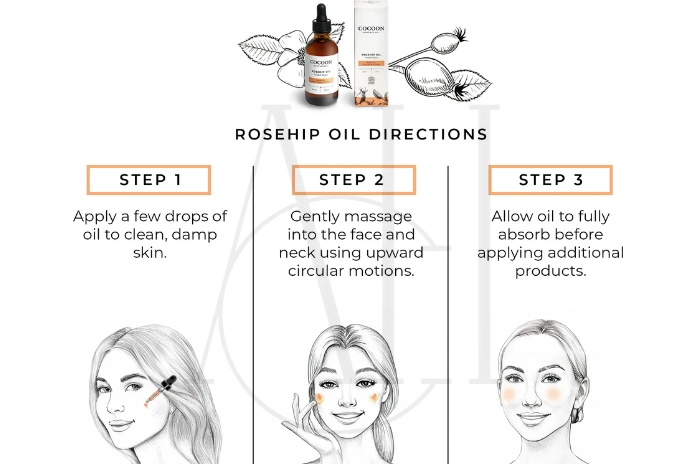Rosehip oil benefits for hair have gained significant attention as people seek natural solutions for hair and scalp concerns. This nutrient-rich oil, extracted from rosa canina seeds, offers vitamins, fatty acids, and antioxidants that transform hair care routines.
The popularity of rose hip oil for hair growth stems from its unique composition of linoleic acid, vitamin A, and essential fatty acids. Unlike synthetic treatments, this clean vegan hair oil provides gentle yet effective care for various hair types.
Understanding how rosehip oil for shiny hair works begins with recognizing its molecular structure. The oil’s lightweight consistency allows deep penetration into hair shafts and scalp, delivering concentrated nutrients where needed most.
Table of Contents
ToggleRosehip Oil Benefits for Hair Growth and Scalp Care
Rosehip oil benefits for hair have gained significant attention as people seek natural solutions for hair and scalp concerns. This nutrient-rich oil, extracted from rosa canina seeds, offers vitamins, fatty acids, and antioxidants that transform hair care routines.
The popularity of rose hip oil for hair growth stems from its unique composition of linoleic acid, vitamin A, and essential fatty acids. Unlike synthetic treatments, this clean vegan hair oil provides gentle yet effective care for various hair types.
Understanding how rosehip oil for shiny hair works begins with recognizing its molecular structure. The oil’s lightweight consistency allows deep penetration into hair shafts and scalp, delivering concentrated nutrients where needed most.
Research Findings on Rosehip Seed Oil for Hair Loss
Scientific studies have examined organic rosehip seed oil potential in addressing hair loss concerns. Research indicates that linoleic acid for hair and skin found in rosehip oil helps strengthen hair follicles and reduce inflammation contributing to hair thinning.
A 2019 study investigating plant-based oils for hair health found that linoleic acid-rich oils demonstrated improved hair retention rates over 12 weeks. The anti inflammatory scalp oil properties were particularly notable in reducing scalp irritation.
Laboratory analysis reveals vitamin A in rosehip oil exists as natural retinyl palmitate, supporting cellular regeneration in hair follicles. This vitamin A form is gentler than synthetic retinoids while providing regenerative benefits for hair growth oil effectiveness.
Key Rosehip Oil Benefits for Hair Health
| Benefit | Active Component | Effect on Hair |
|---|---|---|
| Scalp Hydration | Linoleic Acid (30-35%) | Deep moisture without grease |
| Hair Strength | Vitamin A & E | Improved protein structure |
| Elasticity | Essential Fatty Acids | Reduced breakage and flexibility |
| Anti-inflammatory | Antioxidants | Soothed scalp irritation |
| Protection | Vitamin C | UV and pollution defense |
Scalp hydration represents one of the most immediate benefits. The oil’s molecular structure penetrates deeply into scalp tissue, providing long-lasting moisture. This makes it effective as dry scalp treatment for flakiness or irritation.
The antioxidant hair oil properties protect hair from environmental damage, including UV radiation and pollution. These antioxidants neutralize free radicals that weaken hair structure and contribute to premature follicle aging.
For chemically treated hair, rosehip oil serves as an excellent option to nourish damaged brittle hair. The oil fills microscopic gaps in hair cuticles, restoring elasticity and reducing breakage.

How Rosehip Oil Improves Hair Elasticity
Hair elasticity indicates hair health, and rosehip oil excels at restoration. The process begins when fatty acids penetrate the hair cortex, rebuilding protein structure that provides flexibility and strength.
To improve hair elasticity with rosehip oil, the key lies in understanding oil-protein interactions. Linoleic acid has unique keratin affinity, allowing seamless integration with hair’s natural structure and reinforcing weak points.
Regular use creates a protective barrier maintaining moisture levels crucial for elasticity. Properly hydrated hair stretches and bends without breaking, reducing split ends and breakage common with dry, brittle hair.
Hair strength improvement typically becomes noticeable after 4-6 weeks of consistent use. Users report more pliable, manageable hair with reduced tangling and easier styling.
Who Should Use Rosehip Oil and When to Avoid It
Rosehip oil for hair suits various hair types, making it versatile among natural treatments. Individuals with dry, damaged, or chemically processed hair often see dramatic improvements.
People experiencing rosehip oil for dry flaky scalp conditions find particular relief. Anti-inflammatory properties soothe irritated scalp tissue while moisturizing effects address underlying dryness causing flaking.
Those interested in grey hair treatment may benefit from vitamin A content supporting healthy melanin production. While it won’t reverse graying, the oil maintains grey hair health, creating shinier, more vibrant appearance.
However, certain individuals should exercise caution. People with rose allergies should perform patch tests. Those with very fine or oily hair may find rosehip oil weighs down hair if used excessively.
Potential Benefits of Rosehip Oil for Hair Loss
The relationship between rosehip oil benefits for hair and hair loss prevention involves multiple mechanisms supporting follicle health. Anti-inflammatory properties create optimal environments for hair growth by reducing scalp inflammation.
Rose hip oil for hair growth shows promise in addressing androgenetic alopecia. The oil’s ability to improve scalp blood circulation may deliver nutrients more effectively to follicles, potentially slowing pattern baldness progression.
Studies suggest linoleic acid for hair and skin may regulate sebum production. Excess sebum clogs hair follicles and contributes to hair loss, making this regulatory effect beneficial for seborrheic hair loss.
The oil’s vitamin content supports collagen production in scalp tissue. Healthy collagen levels maintain strong hair follicles and surrounding tissue structure supporting hair growth.
Understanding the Scientific Evidence for Rosehip Oil
Scientific foundation supporting rosehip oil benefits continues growing as researchers investigate effectiveness mechanisms. Peer-reviewed studies identify specific compounds contributing to hair health benefits.
Research on organic rosehip seed oil reveals unique fatty acid profiles make it particularly effective at penetrating hair cuticles. This penetration delivers nutrients to hair cortex for maximum structural impact.
Clinical trials examining antioxidant hair oil effectiveness consistently show natural oils with high antioxidant content provide measurable protection against oxidative stress in follicles.
Evidence for rosehip oil as carrier oil for hair products is supported by excellent compatibility with other beneficial ingredients. Its stability and penetration properties make it ideal for multi-ingredient treatments.
FAQ :Rosehip Oil Benefits for Hair Growth and Scalp Care
What scientific evidence supports rosehip oil benefits for hair?
Multiple peer-reviewed studies document rosehip oil’s anti-inflammatory properties, high linoleic acid content, and antioxidant effects supporting hair follicle health.
How does rosehip oil improve hair elasticity and strength?
Rosehip oil’s linoleic acid penetrates hair cortex to rebuild protein structures while maintaining optimal hydration for flexible, breakage-resistant hair.
Who should consider using rosehip oil on hair?
Individuals with dry, damaged, chemically processed hair or scalp dryness benefit most, though most hair types can safely use this treatment.
Can rosehip oil help with hair loss issues?
Research suggests rosehip oil may support hair retention through anti-inflammatory effects, improved circulation, and follicle-nourishing nutrients, though results vary.




